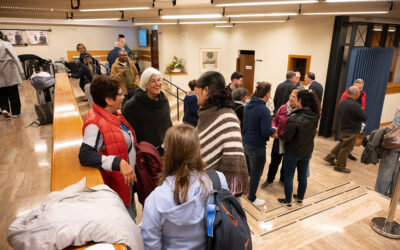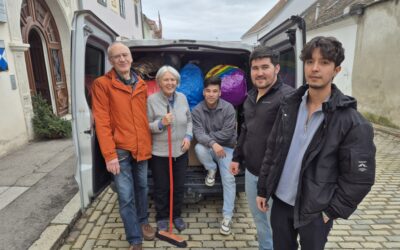This program of life is concrete and essential. It alone could create a different society, one richer in brotherly love and solidarity. This program was part of a mandate given to Christians in Asia Minor. These communities had succeeded in establishing peace between Jews and Gentiles, the two peoples that up to then represented a divided humanity.
Unity, brought by Christ, needs to always be revived and translated into concrete social actions that are inspired entirely by mutual love. In this word of life we find specific pointers on how our relationships should be:
«Be kind to one another, compassionate, forgiving one another as God has forgiven you in Christ»
Kindness means to want what is good for others. It means “making ourselves one” with them, drawing close to them completely setting aside our own interests, ideas and the many preconceived notions that often cloud our vision. We do this so that we can take on the others’ burdens, their needs and their sufferings, and also as to share in their joys.
It means entering into the hearts of the people we meet in order to understand their mentality, culture and traditions and make them, in a certain sense, our own. In this way we can truly understand what they need and we can discern those values that God has placed in each person’s heart. In a word, kindness means to live for others.
Mercy means to welcome others as they are, not as we would like them to be, with a different personality, with political views that match our own, with religious convictions like ours, and without those defects and habits that irritate us. No, we need to expand our hearts so that they are capable of welcoming all people with all their differences, limitations and problems.
Forgiveness means to see the other person always with new eyes. Even in the most beautiful and peaceful environments in the family, at school and at work, there are inevitably moments of friction, differences and arguments. Sometimes we avoid each other, or we are not on speaking terms or, not to mention when we nourish sentiments of hatred towards those who do not think the way we do. We need instead to make a determined choice to try to see each brother and sister as if for the first time, a completely new person, without remembering how he or she offended us, but covering everything over with love, with absolute amnesty in our hearts, in imitation of God, who forgives and forgets.
True peace and unity can be attained when kindness, mercy and forgiveness are lived not only by people individually, but by people together, in reciprocity.
Just as the embers in a fireplace have to be stirred to prevent them from being smothered by the ashes, it is necessary from time to time to take steps to revive our mutual love and give fresh life to our relationships with everyone, so that they will not be smothered by the ashes of indifference, apathy and selfishness.
«Be kind to one another, compassionate, forgiving one another as God has forgiven you in Christ»
These attitudes need to be translated into life, into concrete actions.
Jesus showed us what love is when he healed the sick and fed the crowds, when he brought the dead back to life, and when he washed the feet of his disciples. Deeds, concrete deeds: this is what it means to love.
I remember a mother in an African family whose daughter Rosangela had lost an eye after a young boy poked her with a stick and even afterwards continued to make fun of her. Neither parent of the boy had come to say that they were sorry. There was only silence. Rosangela’s mother felt bitter towards this family. Rosangela, on the other hand, had forgiven the boy, and said to her mother, “You should take comfort in the fact that luckily I still have one good eye.”
“One morning,” Rosangela’s mother later shared, “the boy’s mother asked me to go and visit her because she was sick. My reaction was: ‘Why is she asking me to help? She has many other neighbors who live near her. After what her son did to us, how dare she come to me for help?’
“But right away I remembered that love knows no limits. I hurried over to her house. She came to open the door and then fainted in my arms. I took her to the hospital and waited there with her until the doctors could take care of her. A week later she was discharged from the hospital and she came to my house to thank me. I welcomed her warmly, I had made it finally to forgive her and we are on very good terms now.”
We too can fill our days with concrete, humble, intelligent acts of service that express our love toward others. And brotherhood and peace will spread around us.
Chiara Lubich




0 Comments